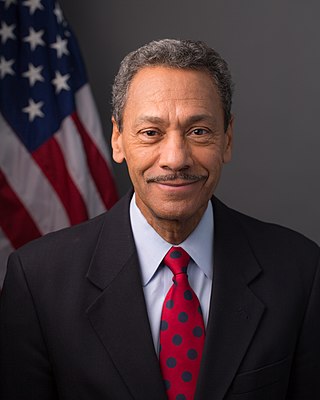
Melvin Luther Watt is an American politician who served as director of the Federal Housing Finance Agency from 2014 to 2019. He was appointed by President Barack Obama. He is a former United States Representative for North Carolina's 12th congressional district, from 1993 to 2014. He is a member of the Democratic Party.
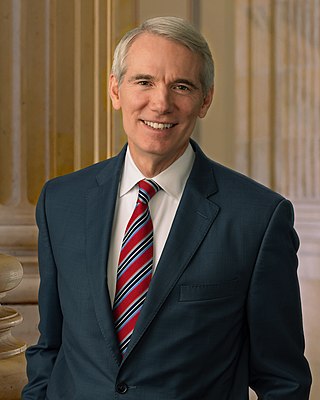
Robert Jones Portman is an American attorney and politician who served as a United States senator from Ohio from 2011 to 2023. A member of the Republican Party, Portman was the 35th director of the Office of Management and Budget (OMB) from 2006 to 2007, the 14th United States trade representative from 2005 to 2006, and a U.S. representative from 1993 to 2005, representing Ohio's 2nd district.
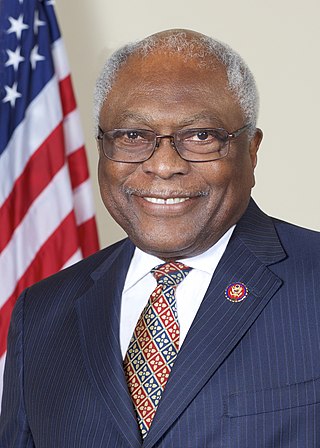
James Enos Clyburn is an American politician serving as the U.S. representative for South Carolina's 6th congressional district. First elected in 1992, Clyburn represents a congressional district that includes most of the majority-black precincts in and around Columbia and Charleston, as well as most of the majority-black areas outside Beaufort and nearly all of South Carolina's share of the Black Belt. Since Joe Cunningham's departure in 2021, Clyburn has been the only Democrat in South Carolina's congressional delegation and as well as the dean of this delegation since 2011 after fellow Democrat John Spratt lost re-election.
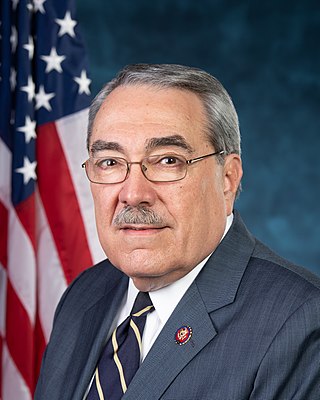
George Kenneth Butterfield Jr. is an American lawyer and politician who served as the U.S. representative for North Carolina's 1st congressional district from 2004 to 2022. A member of the Democratic Party, he was first elected in a special election after the resignation of Frank Ballance.

Addison Graves "Joe" Wilson Sr. is an American politician and attorney serving as the U.S. representative for South Carolina's 2nd congressional district since 2001. A member of the Republican Party, his district stretches from Columbia to the Georgia–South Carolina border. He served as the South Carolina state senator from the 23rd district from 1985 to 2001.

Michael Clifton Burgess is an American physician and politician representing Texas's 26th congressional district in the United States House of Representatives. The district is anchored in Denton County, a suburban county north of Dallas and Fort Worth. He has held the position since 2003 and is a member of the Republican Party.
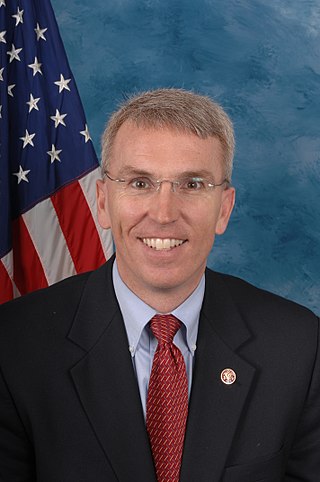
Todd Russell Platts is an American attorney and Republican Party politician who serves as a Judge on the York County Court of Common Pleas and is a former U.S. Representative for Pennsylvania's 19th congressional district, serving from 2001 to 2013.

John Bayard Taylor Campbell III is an American politician who served as a U.S. representative from California from 2005 to 2015. A member of the Republican Party, he previously served in the California State Assembly (2000–2004) and California State Senate (2004–2005). In Congress, Campbell represented the state's 48th congressional district for four terms and 45th congressional district for one term. On June 27, 2013, he announced that he would not seek reelection in 2014.

Ralph Warren Norman Jr. is an American real estate developer and politician who has served as the U.S. representative for South Carolina's 5th congressional district since 2017. His district includes most of the South Carolina side of the Charlotte metropolitan area, along with outer portions of the Upstate and Midlands. A member of the Republican Party, Norman served as the South Carolina state representative for the 48th district from 2005 to 2007 and from 2009 to 2017.

South Carolina's 5th congressional district is a congressional district in northern South Carolina bordering North Carolina. The district includes all of Cherokee, Chester, Fairfield, Kershaw, Lancaster, Lee, Union and York counties and parts of Newberry, Spartanburg and Sumter counties. The bulk of its population lives on the South Carolina side of the Charlotte metropolitan area, including the rapidly growing cities of Rock Hill, Fort Mill, and Lake Wylie. Outside the Charlotte suburbs, the district is mostly rural and agricultural. The district borders were contracted from some of the easternmost counties in the 2012 redistricting.

Tracey Robert Mann is an American businessman and politician who has served as the U.S. representative from Kansas's 1st congressional district since 2021. The district, popularly known as "the Big First," includes parts of 63 counties in central and western Kansas and is the seventh-largest district in the nation that does not cover an entire state.
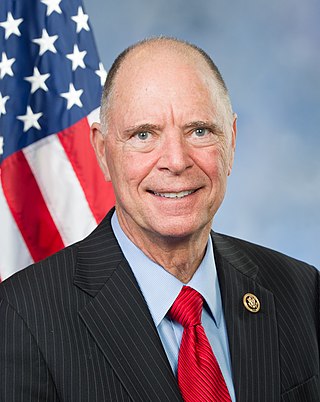
William Joseph Posey is an American businessman and politician serving as the U.S. representative for Florida's 8th congressional district, in Congress since 2009. A member of the Republican Party, he formerly served in the Florida Senate and the Florida House of Representatives.
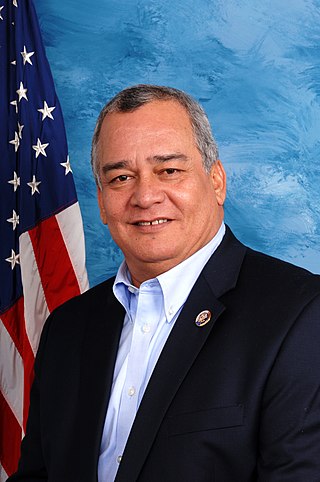
Gregorio Kilili Camacho Sablan is a Northern Mariana Islander politician and former election commissioner. Elected in 2008, Sablan became the first delegate to the United States House of Representatives from the Commonwealth of the Northern Mariana Islands.

Harold Watson "Trey" Gowdy III is an American television news presenter, former politician and former federal prosecutor who served as the U.S. representative for South Carolina's 4th congressional district from 2011 to 2019. His district included much of the Upstate region of South Carolina, including Greenville and Spartanburg.
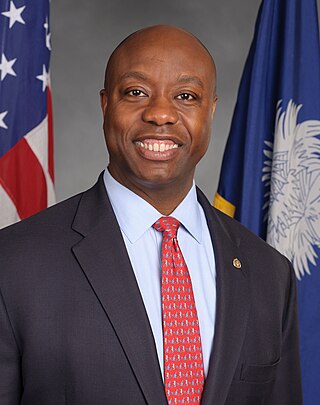
Timothy Eugene Scott is an American businessman and politician serving as the junior United States senator from South Carolina since 2013. A member of the Republican Party, he previously served as a member of the Charleston County Council, a state representative, and a U.S. Representative. He also worked in financial services before entering politics.

John MichaelMulvaney is an American politician who served as director of the Office of Management and Budget (OMB) from February 2017 until March 2020, and as acting White House Chief of Staff from January 2019 until March 2020. Prior to his appointments to the Trump administration, he served in the U.S. House of Representatives.
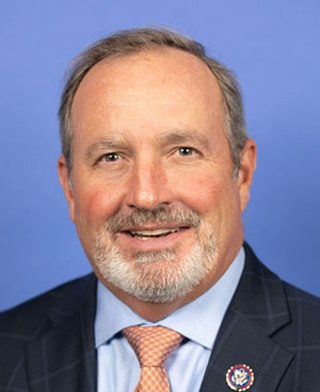
Jeffrey Darren Duncan is a United States representative for South Carolina's 3rd congressional district since 2011. His district comprises nine counties, two of these counties being manufacturing centers for the state. On January 17, 2024, Duncan announced that he would not run for re-election. Duncan previously served in the South Carolina House of Representatives from 2002 to 2010 when he retired to run for the U.S. House of Representatives.

James Daniel Bishop is an American attorney and politician serving as the U.S. representative for North Carolina's 8th congressional district since 2019, when the district was numbered “9”. As a Republican, his district includes south-central Mecklenburg, Union, Anson, Richmond, Scotland, Robeson, Hoke, and southern Moore Counties. He served in the North Carolina House of Representatives from 2015 to 2017 and the Mecklenburg County Commission from 2005 to 2009. He served in the North Carolina State Senate from 2017 to 2019.

William Richardson Timmons IV is an American politician, prosecutor, and Air Force veteran serving as the U.S. representative for South Carolina's 4th congressional district since 2019. His district is in the heart of the Upstate and includes Greenville, Spartanburg, and most of their suburbs. A member of the Republican Party, Timmons served as a South Carolina state senator from 2016 to 2018.
Archie William Parnell Jr. is an American attorney and politician. He was the Democratic Party's nominee for the June 20, 2017, special election for South Carolina's 5th congressional district of the United States House of Representatives. He narrowly lost the election to Republican Ralph Norman, receiving 47.9 percent of the vote in the general election, an unexpectedly close margin. Parnell challenged Norman again in the 2018 election to lose again having earned 41.5 percent of the vote.






















